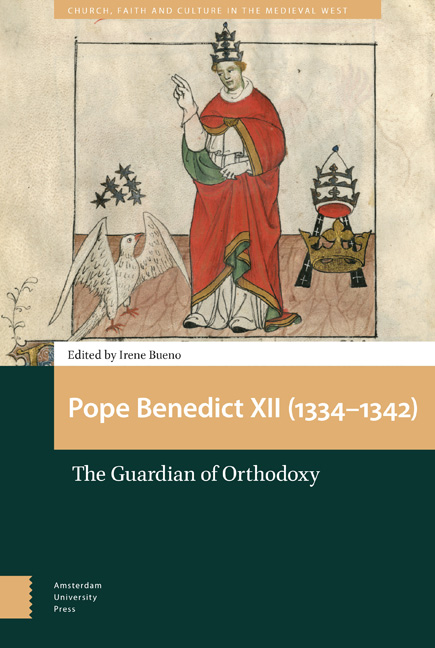Book contents
- Frontmatter
- Contents
- Abbreviations
- List of Illustrations
- Introduction: Benedict XII, the Guardian of Orthodoxy
- 1 Jacques Fournier and Thirteenth-Century Inquisitorial Methods
- 2 Recovering a Theological Advice by Jacques Fournier
- 3 Benedict XII and the Beatific Vision
- 4 A New Seat for the Papacy: Benedict XII, Avignon, and the Comtat Venaissin
- 5 In the Footsteps of St Peter: New Light on the Half-Length Images of Benedict XII by Paolo da Siena and Boniface VIII by Arnolfo di Cambio in Old St Peter’s
- 6 Benedict XII and Italy: Restoring Orthodoxy and Consolidating Papal Sovereignty after John XXII
- 7 Benedict XII and the Outbreak of the Hundred Years’ War
- 8 Benedict XII and the Crusades
- 9 Benedict XII and the Partes Orientis
- Index of Names
- Index of Subjects
7 - Benedict XII and the Outbreak of the Hundred Years’ War
Published online by Cambridge University Press: 11 December 2020
- Frontmatter
- Contents
- Abbreviations
- List of Illustrations
- Introduction: Benedict XII, the Guardian of Orthodoxy
- 1 Jacques Fournier and Thirteenth-Century Inquisitorial Methods
- 2 Recovering a Theological Advice by Jacques Fournier
- 3 Benedict XII and the Beatific Vision
- 4 A New Seat for the Papacy: Benedict XII, Avignon, and the Comtat Venaissin
- 5 In the Footsteps of St Peter: New Light on the Half-Length Images of Benedict XII by Paolo da Siena and Boniface VIII by Arnolfo di Cambio in Old St Peter’s
- 6 Benedict XII and Italy: Restoring Orthodoxy and Consolidating Papal Sovereignty after John XXII
- 7 Benedict XII and the Outbreak of the Hundred Years’ War
- 8 Benedict XII and the Crusades
- 9 Benedict XII and the Partes Orientis
- Index of Names
- Index of Subjects
Summary
Abstract
This chapter addresses the nature of Anglo-papal relations in the years that preceded the outbreak of the Hundred Years’ War – namely the period between 1334, when Benedict XII was elected, and the summer of 1338, when Edward III left England for the continent and the hostilities between England and France began. The chapter discusses how effective Benedict XII's arbitration was in the years leading up to the outbreak of the conflict, using Anglo-French and French-papal diplomatic correspondence. The chapter concludes that Benedict XII’s attempt at preventing the outbreak of the war should not be negatively assessed on the basis of its outcome. Arguably, the pope reacted and engaged with the political circumstances using all the means at his disposal, but was not able to control Edward III, Louis of Bavaria, and Philip VI's individual agendas. If anything, Benedict XII's failed attempts at preventing the outbreak of the Anglo-French conflict therefore evidence the inability of the late-medieval papacy to carry any political weight before the secular rulers rather than his personal miscalculation of the circumstances.
Keywords: Pope Benedict XII, Hundred Years’ War, Edward III, king of England, Philip VI, king of France, diplomacy, Louis of Bavaria
The rich historiography on the Hundred Years’ War has not paid much attention to the role of Benedict XII as a political actor in the first five years of the Anglo-French conflict. Mentions of Benedict's efforts are indeed only brief and limited to his failed attempts at organizing a crusade in 1334–1335, securing Anglo-French collaboration, and establishing a truce between the two parties in the early 1340s after the outbreak of the war. On the one hand, French historian Edouard Perroy defined the papal attempts at delaying the outbreak of the war and pacifying the two parties through truces as ‘dogged but ill-fated’, while Jonathan Sumption addressed the pope's attitude in dealing with Philip VI as ‘faultless’, ‘realistic’, ‘austere and independent’, pointing out that ‘of all the Avignon popes [Benedict XII] was the least sympathetic to French interests’. On the other hand, Templeman maintained that the circumstances which lead to the outbreak of the Hundred Years’ War had already characterized earlier Anglo-French crises, and that in 1337 the conflict broke out owing to the lack of political standing of Benedict XII, Edward III, and Philip VI.
- Type
- Chapter
- Information
- Pope Benedict XII (1334–1342)The Guardian of Orthodoxy, pp. 191 - 216Publisher: Amsterdam University PressPrint publication year: 2018
- 1
- Cited by

